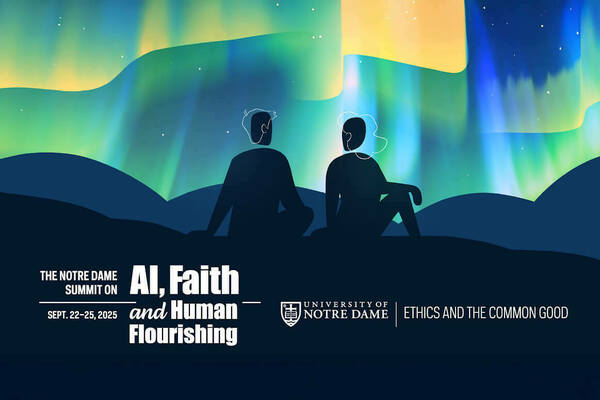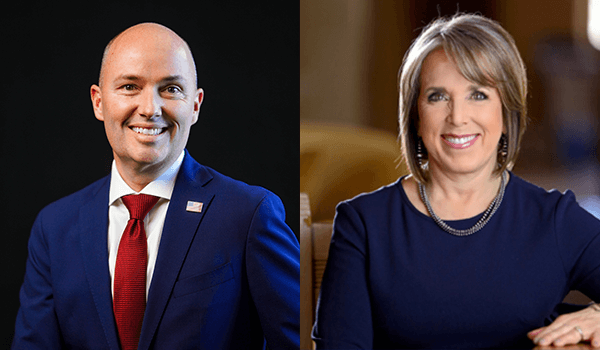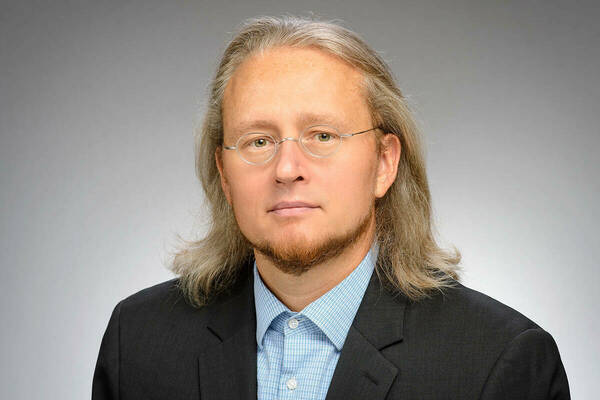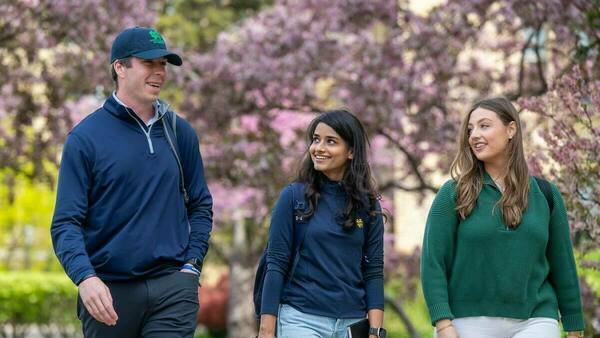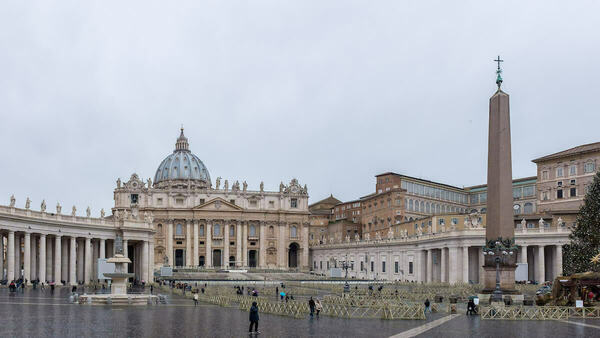Rev. Robert A. Dowd, C.S.C., elected 18th president of the University of Notre Dame
The Board of Trustees of the University of Notre Dame has elected Rev. Robert A. Dowd, C.S.C., as the University’s 18th president, effective July 1. He will succeed Rev. John I. Jenkins, C.S.C., who announced in October that he will step down at the end of the 2023-24 academic year after serving as president for 19 years.
“We are thrilled that Father Dowd will be Notre Dame’s next leader,” said Jack Brennan, chair of Notre Dame’s Board of Trustees. “His character and intellect, along with his broad academic and administrative experience and his deep commitment to Notre Dame, make him an ideal person to lead the University into the future. Since its founding, Notre Dame has been led by a priest-president from the Congregation of Holy Cross, the religious order to which Father Sorin, the University’s founder, belonged. The University has had only three presidents in the last 70 years, each exceptional in their own right — Father Jenkins, Father Edward Malloy, C.S.C., and Father Theodore Hesburgh, C.S.C. Father Dowd continues in this rich tradition.”
“I am deeply humbled and honored by the Board’s decision,” Father Dowd said. “We can all be grateful for Father Jenkins’ selfless and courageous leadership for almost two decades. Working together with others, his efforts have positioned the University extremely well in every way. We will build on those efforts. Informed by our Catholic mission, we will work together so that Notre Dame is an ever-greater engine of insight, innovation and impact, addressing society’s greatest challenges and helping young people to realize their potential for good.”
“I thank and congratulate our Board of Trustees on selecting Father Dowd as Notre Dame’s next president,” Father Jenkins said. “An accomplished scholar, a dedicated teacher and an experienced administrator, Father Bob is also a faithful and generous priest. He will lead the University to being even more powerfully a force for good in the world.”
Father Dowd currently serves as vice president and associate provost for interdisciplinary initiatives at Notre Dame, a position he has held since 2021. He is also an associate professor of political science and serves as a Fellow and Trustee of the University and religious superior of the Holy Cross community at Notre Dame.
A native of Michigan City, Indiana, Father Dowd graduated from Notre Dame in 1987, earning a bachelor’s degree in psychology and economics, and entered Moreau Seminary in the fall of that year to explore his vocation to religious life and priesthood. During his time in the seminary, he asked to be assigned to East Africa and spent 18 months there. After professing final vows in the Congregation of Holy Cross in 1993 and being ordained a priest in 1994, he worked in Campus Ministry at Notre Dame, serving as associate rector of the Basilica of the Sacred Heart and as an assistant rector in one of the University’s residence halls.
He began his graduate studies at UCLA in 1996, earning an M.A. in African studies in 1998 and a doctorate in political science in 2003. In 2004, Father Dowd joined Notre Dame’s political science department as a member of the faculty. Specializing in comparative politics, his research has focused on how Christian and Islamic religious communities affect support for democratic institutions, especially in sub-Saharan Africa. He has published articles in leading academic journals and a book with Oxford University Press.
In his current role, Father Dowd oversees several institutes, centers and other academic units at Notre Dame, including the Center for Social Concerns, DeBartolo Performing Arts Center, Fitzgerald Institute for Real Estate, iNDustry Labs, Institute for Educational Initiatives, Lucy Family Institute for Data and Society, McGrath Institute for Church Life, Notre Dame Technology Ethics Center, Office of Military and Veterans Affairs, ROTC programs and the Raclin Murphy Museum of Art. He also directs the approval and review process of institutes and centers.
He was previously an assistant provost for internationalization with Notre Dame International, where his primary responsibilities included overseeing the Dublin Global Gateway and Kylemore Abbey Global Centre in Ireland and the São Paulo Global Center in Brazil, and establishing an office in Nairobi, Kenya, to promote and support Notre Dame’s research and educational partnerships in Africa.
He is the founder of Notre Dame’s Ford Program in Human Development Studies and Solidarity at the Kellogg Institute for International Studies, which is animated by Catholic social teaching and dedicated to forging community-engaged research partnerships in the Global South. He is a fellow of the Ansari Institute for Global Engagement with Religion, the Kellogg Institute for International Studies, the Kroc Institute for International Peace Studies and the Nanovic Institute for European Studies in the University’s Keough School of Global Affairs. He also serves as a trustee of Stonehill College in Easton, Massachusetts, and a board member of Brother Andre Hospital in Nairobi.
Father Dowd’s research has focused on African politics, identity politics, and religion and politics. His research has also explored the effects of religious beliefs and institutions on the integration of migrants/refugees in Europe and the effects of faith-based schools on citizenship and civic engagement in Africa. He is the author of the book “Christianity, Islam, and Liberal Democracy: Lessons from Sub-Saharan Africa.”
Over his 19-year tenure as president, Father Jenkins is credited with advancing Notre Dame’s mission as a Catholic research university; attracting and supporting superb faculty; fostering dramatic growth in research at the University; securing Notre Dame’s admission in the Association of American Universities; ensuring the University’s financial strength; admitting a talented, diverse student body; promoting continued excellence in undergraduate instruction; expanding Notre Dame’s global engagement; and offering students an in-person education during the COVID-19 pandemic. A longtime member of the Commission on Presidential Debates, he is recognized nationally as an advocate of civil discourse, and he is a leading voice on the future of college athletics.
A video announcement is available here and a history of the University’s presidency is available here.
Latest ND NewsWire
- Notre Dame to host summit on AI, faith and human flourishing, introducing new DELTA frameworkThe Institute for Ethics and the Common Good and the Notre Dame Ethics Initiative will host the Notre Dame Summit on AI, Faith and Human Flourishing on the University’s campus from Monday, Sept. 22 through Thursday, Sept. 25. This event will draw together a dynamic, ecumenical group of educators, faith leaders, technologists, journalists, policymakers and young people who believe in the enduring relevance of Christian ethical thought in a world of powerful AI.
- Notre Dame Democracy Initiative hosts bipartisan conversation with Western state governorsTwo Western state governors known to work across the aisle on policy issues such as water, housing and energy will visit the University of Notre Dame for a fireside chat about how Western state pragmatism can serve as a model for the country to overcome polarization.
- In new research, Roy Scranton explores climate change and the limits of human progressIn his most recent book, “Impasse: Climate Change and the Limits of Progress,” Scranton, an associate professor of English, defines the impasse he sees as “not only political and institutional, but cognitive, existential and narrative” and asserts that the only path forward is through embracing what he terms ethical pessimism. “A lot of people confuse pessimism with nihilism, apathy and despair,” Scranton said. “But pessimism is actually about recognizing our limits, letting go of unrealistic goals, finding solidarity in the fact of human suffering and doing what you can now, not in some utopian future.
- Notre Dame MBA launches deferred admission programThe Notre Dame MBA Deferred Admission Program allows candidates with little or no work experience, including college seniors, to secure admission before reaching the recommended three years of work experience to enroll.
- ‘Prebunking’ false election claims may boost trust in electionsIn recent years, democracies worldwide have seen a growing erosion of trust in election outcomes and institutions, driven in part by fears of widespread fraud. New Notre Dame research finds that “prebunking” — providing accurate information before false claims spread — boosts trust in elections more effectively than traditional fact-checking.
- ND experts on the canonization of Carlo AcutisAs the Church awaits the ceremony in St. Peter’s Square, where Pope Leo XIV will formally declare Acutis a saint, University of Notre Dame experts Kathleen Sprows Cummings, Brett Robinson and Timothy O’Malley reflect on his life and his path to sainthood.








